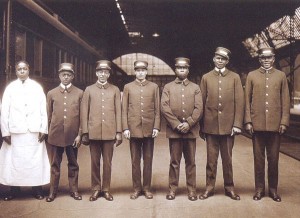PVAMU Alum Nathelyne Kennedy, P.E., named 2016 Houston Engineer of the Year
Prairie View A&M University congratulates distinguished alumna Nathelyne Archie Kennedy, P.E. on being named the 2016 Houston Engineer of the Year by Houston’s branch of the National Engineers’ Week Foundation.
Kennedy founded her own engineering consultancy in 1981, and has since built Nathelyne A. Kennedy & Associates into a highly respected company providing civil engineering and program management services for highway, mass transit, street, bridge, aviation, port, water and wastewater, educational campus, and sports complex projects.
A Conroe native, she was the university’s first female engineering graduate (1959). After beginning her career in Chicago, she returned to Houston and in 1979 became the first African-American woman to attain a professional engineering license in the State of Texas. She was one of three African American women engineers profiled in a 1984 Ebony article, “Engineering Their Way to the Top.”
Ms. Kennedy shares her entrepreneurship experience by mentoring women, minorities and students. She also endowed a scholarship for architecture and engineering students at Prairie View. In 2006, the new School of Architecture building and History and Culture center was named in her honor.
The Houston Chapter of Women’s Transportation Seminar International celebrated the 35th anniversary of Ms. Kennedy attaining her professional engineering license by conferring on her in 2014 their inaugural Trailblazer Award.
NYT Review, In ‘Alex Haley: And the Books That Changed a Nation,’ a Reputation Made and Lost
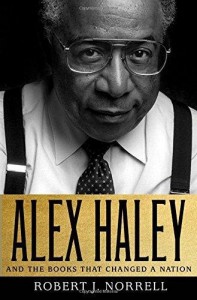 In his review for the New York Times, Dwight Garner writes: “Alex Haley wrote “The Autobiography of Malcolm X” (1965), in collaboration with its subject, and “Roots: The Saga of a Family” (1976), two of the most important books by an African-American in the second half of the 20th century.
In his review for the New York Times, Dwight Garner writes: “Alex Haley wrote “The Autobiography of Malcolm X” (1965), in collaboration with its subject, and “Roots: The Saga of a Family” (1976), two of the most important books by an African-American in the second half of the 20th century.
“Each sold more than six million copies. Each had a profound impact on black identity in America. Each was billed as nonfiction but, crucially, only the Malcolm X book should have been so designated. Therein lies the painful story of a literary reputation made and lost, one that is told simply and well in Robert J. Norrell’s “Alex Haley: And the Books That Changed a Nation.”
“This is the first biography of Haley (1921-1992), and as such it is long overdue. In 1976 and 1977, when “Roots” was published and then made into a hit mini-series that ran on eight consecutive nights on ABC, Haley was among the best-known writers alive. He appeared on the cover of Time magazine.”
Read the remainder of Garner’s review here.
Pullman Porter Museum launches online registry of black railroad laborers
Pullman Porters
An online registry will be launched by the A. Philip Randolph Pullman Porter Museum, with help from DePaul University, this week in Chicago. Descendants and scholars will be able to preserve oral histories on the website that otherwise might be lost.
“(Railroad workers) are not among those selected annually to parade during Black History Month, but they represent a real concrete example of ordinary men who did an extraordinary thing,” said Lyn Hughes, the founder of the Pullman museum. “They made a place for us, and they made history.”
Now her initiative is one of several projects and events that aim to commemorate the centennial of the Great Migration (1916-1970) when 6 million African-Americans attracted by manufacturing jobs and a better quality of life moved to Northern cities. About 500,000 African-Americans moved to Chicago, transforming the city’s demographic landscape from 2 percent black, prior to the Great Migration, to 33 percent in 1970.
Read more about the registry in the Chicago Tribune story here.
The railroad sleeping car was developed during the industrial revolution. Within a few years, its success created huge increases in the transportation industry. This national need for labor provided free African-Americans with new employment opportunities in a new industry. The passenger railroad industry provided national travel for people even before the invention of the automobile and construction of the national highway system, and the advent of commercial air flight.
The Pullman Palace Car Company built, owned, and operated the majority of the passenger trains during this era. These luxurious trains were known as “hotels on wheels” because passengers could amuse themselves with social activities and conversation in the lounge cars, eat meals in the dining cars, and rest comfortably overnight in the sleeping cars. Train travel was truly revolutionary because it allowed the common person a higher level of personal freedom and traveling comfort than ever before in history.
Pullman Porters were the workers aboard the trains. They provided service to and attended to the needs of the passengers. In the beginning, the Pullman Company hired only African-American men for the job of porter. The Pullman Porters and the excellent service they provided were integral and indispensable to the rise and success of the passenger railroad industry.
20th Anniversary: Texas Black Sports Hall of Fame 2016 induction ceremonies, Feb. 20
 The Texas Black Sports Hall of Fame, part of the African American Museum in Dallas, will hold induction ceremonies during its 20th anniversary luncheon on Feb. 20 at the Holiday Inn Crowne Plaza Market Center in Dallas at 11:30 a.m.
The Texas Black Sports Hall of Fame, part of the African American Museum in Dallas, will hold induction ceremonies during its 20th anniversary luncheon on Feb. 20 at the Holiday Inn Crowne Plaza Market Center in Dallas at 11:30 a.m.
The ten new inductees will include: Hilton Lee Smith (Prairie View), Negro League’s pitching ace; wide receiver and world class sprinter Clifford Branch (Houston Worthing High School and Oakland Raiders), Conroe Washington head coach Charles Brown (two-time winner PVIL state football championship), and PVAMU Sports Hall of Fame member James Clemons (tennis).
Click here for more information.
TBHPP Bookshelf
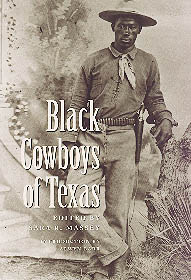 Published scholarship on black history in Texas is growing and we’d like to share with you some suggested readings, both current and past, from some of the preeminent history scholars in Texas and beyond. We invite you to take a look at our bookshelf page — including a featured selection — and check back as the list grows. A different selection will be featured each week. We welcome suggestions and reviews. This week, we offer, Black Cowboys of Texas, edited by Sara R. Massey.
Published scholarship on black history in Texas is growing and we’d like to share with you some suggested readings, both current and past, from some of the preeminent history scholars in Texas and beyond. We invite you to take a look at our bookshelf page — including a featured selection — and check back as the list grows. A different selection will be featured each week. We welcome suggestions and reviews. This week, we offer, Black Cowboys of Texas, edited by Sara R. Massey.
In the early days of Texas, the work of the cowhand was essential to the newly arrived settlers building a life on the frontier. The story of the Anglo cowboys who worked the ranches of Texas is well known, but much more remains to be discovered about the African American cowhands who worked side-by-side with the vaqueros and Anglo cowboys.
Twenty-five writers here recount tales of African Americans such as Peter Martin, who hauled freight and assisted insurgents in a rebellion against the Mexican government while building a herd of cattle that allowed him to own (through a proxy) rental houses in town. Bose Ikard, a friend of Charles Goodnight, went on Goodnight’s first cattle drive opening the Goodnight-Loving Trail. Johanna July, a Black Seminole woman, had her own method of taming horses in the Rio Grande for the soldiers at Fort Duncan.
This Week In Texas Black History, Feb. 7-13
Calendar courtesy Texas Black History Preservation Project
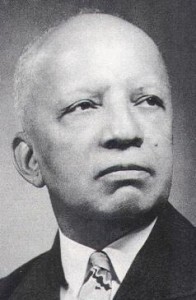 7 – On this date in 1926, historian Dr. Carter G. Woodson, the son of illiterate slaves, initiated the first National Negro Week. In 1972, it was renamed Black History Week and in 1976, it became Black History Month. Said Woodson: “Those who have no record of what their forebears have accomplished lose the inspiration which comes from the teaching of biography and history.”
7 – On this date in 1926, historian Dr. Carter G. Woodson, the son of illiterate slaves, initiated the first National Negro Week. In 1972, it was renamed Black History Week and in 1976, it became Black History Month. Said Woodson: “Those who have no record of what their forebears have accomplished lose the inspiration which comes from the teaching of biography and history.”
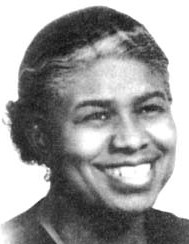 9 – On this date in 1902, civil rights activist Juanita Craft was born in Round Rock. She worked as a maid in Dallas at the Adolphus Hotel from 1925-1934 before joining the Dallas branch of the NAACP in 1935 and beginning several decades of service. She helped organize 182 branches of the NAACP in Texas and in 1944 was the first black woman in Dallas County to vote. In 1946 she was the first black woman deputized in the state to collect the poll tax. Craft also served two terms on the Dallas City Council (1975-1979).
9 – On this date in 1902, civil rights activist Juanita Craft was born in Round Rock. She worked as a maid in Dallas at the Adolphus Hotel from 1925-1934 before joining the Dallas branch of the NAACP in 1935 and beginning several decades of service. She helped organize 182 branches of the NAACP in Texas and in 1944 was the first black woman in Dallas County to vote. In 1946 she was the first black woman deputized in the state to collect the poll tax. Craft also served two terms on the Dallas City Council (1975-1979).
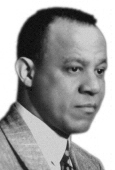 9 – Dr. Lawrence Nixon was born on this day in 1883 in Marshall. Nixon had a successful practice in El Paso where he was a charter member of the city’s branch of the NAACP. In 1923, Nixon challenged a state law that barred African Americans from participating in the Texas Democratic Party’s white’s only electoral primaries. Nixon won two U.S. Supreme Court rulings making the primaries unconstitutional. However, it would be another 20 years before the white primary would finally be abolished.
9 – Dr. Lawrence Nixon was born on this day in 1883 in Marshall. Nixon had a successful practice in El Paso where he was a charter member of the city’s branch of the NAACP. In 1923, Nixon challenged a state law that barred African Americans from participating in the Texas Democratic Party’s white’s only electoral primaries. Nixon won two U.S. Supreme Court rulings making the primaries unconstitutional. However, it would be another 20 years before the white primary would finally be abolished.
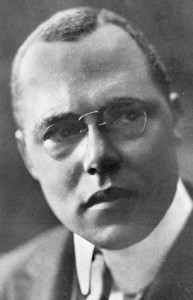 13 – On this day in 1873, Emmett J. Scott was born in Houston. Scott was a journalist and administrator who worked for the Houston Post, but in 1894 he founded Houston’s first black newspaper, the Houston Freeman, a weekly newspaper. For many years, Scott was the personal secretary for Booker T. Washington, and during World War I was in charge of Negro affairs as a special assistant to the U.S. Secretary of War. That position made Scott the highest ranking black person in President Woodrow Wilson’s administration and led to many changes for black soldiers with many of the issues they faced and the participation of black units in World War I outlined in Scott’s The American Negro in the World War (1919). Among the changes Scott helped to bring about were:
13 – On this day in 1873, Emmett J. Scott was born in Houston. Scott was a journalist and administrator who worked for the Houston Post, but in 1894 he founded Houston’s first black newspaper, the Houston Freeman, a weekly newspaper. For many years, Scott was the personal secretary for Booker T. Washington, and during World War I was in charge of Negro affairs as a special assistant to the U.S. Secretary of War. That position made Scott the highest ranking black person in President Woodrow Wilson’s administration and led to many changes for black soldiers with many of the issues they faced and the participation of black units in World War I outlined in Scott’s The American Negro in the World War (1919). Among the changes Scott helped to bring about were:
— The Continuance of training camps for black officers and the increase in their number and enlargement of their scope of training.
— Betterment of the general conditions in the camps where blacks are stationed in large numbers, and positive steps taken to reduce race friction to a minimum wherever soldiers of opposite races are brought into contact.
— An increase from four to 60 in the number of black Army chaplains.
— The opening of every branch of the military service to black men, on equal terms with all others, and the commissioning of many black men as officers in the Medical Corps.
— Large increase in the number of black line officers with the total increasing from less than a dozen at the beginning of the war to more than 1,200.
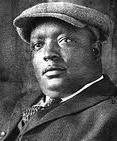 13 – In 1920, on this date, Rube Foster – a native of Calvert, Texas – led the founding of baseball’s first successful all-black league, the Negro National League, headquartered in Kansas City, Mo. Foster was league president, as well as manager and player (pitcher) for the Chicago American Giants. He is known as “the father of black baseball.”
13 – In 1920, on this date, Rube Foster – a native of Calvert, Texas – led the founding of baseball’s first successful all-black league, the Negro National League, headquartered in Kansas City, Mo. Foster was league president, as well as manager and player (pitcher) for the Chicago American Giants. He is known as “the father of black baseball.”
Blog: Ron Goodwin, author, PVAMU history professor
Ron Good  win’s bi-weekly blog appears exclusively for TIPHC/TBHPP. Goodwin is a San Antonio native and Air Force veteran. Generally, his column will address contemporary issues in the black community and how they relate to black history. He and the TIPHC/TBHPP staff welcome your comments. In his latest blog, “Perception is reality, really?” Goodwin examines the stereotypical negative public images of black males.
win’s bi-weekly blog appears exclusively for TIPHC/TBHPP. Goodwin is a San Antonio native and Air Force veteran. Generally, his column will address contemporary issues in the black community and how they relate to black history. He and the TIPHC/TBHPP staff welcome your comments. In his latest blog, “Perception is reality, really?” Goodwin examines the stereotypical negative public images of black males.
Submissions Wanted

